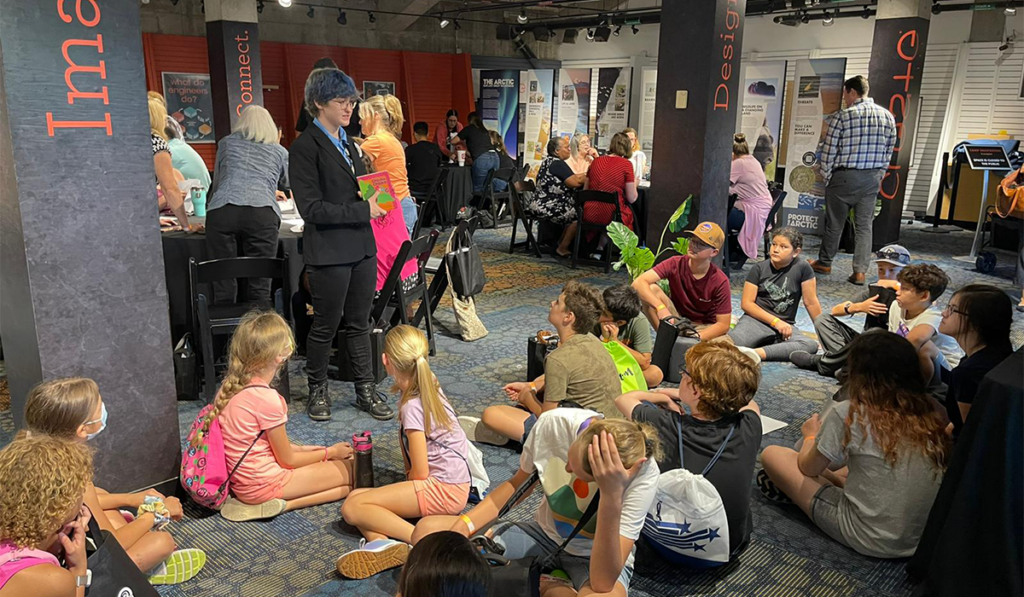
While the SciTech Institute is perhaps best known for its statewide Arizona SciTech Festival held early each year, its efforts actually continue year-round as it brings together collaborators from across the state to advocate for opportunities in Arizona’s growing science, technology, engineering and mathematics (STEM) workforce.
The focus of the ongoing effort is to build the Arizona STEM Ecosystem, a collaborative, grassroots network that has grown to more than 900 business, education, community and government organizations across the state.
Serving as the ecosystem’s backbone organization, SciTech Institute promotes STEM awareness and enthusiasm, builds local and diverse STEM leadership, and supports Arizonans’ entering higher-ed and STEM career pathways.
For example, key achievements include the Institute’s annual STEM & Innovation Summit, which welcomes hundreds of students, formal and informal educators, industry leaders, government officials, and community organizers to the Arizona Science Center in Phoenix for a day of exploration, networking and collaboration.
The 2022 version of the Summit provided opportunities for participants to “Connect, Collaborate and Celebrate” around STEM in Arizona with more than 40 sessions from 60-plus speakers who covered topics that included STEM workforce; sustainability; diversity, equity and inclusion in STEM; cross-sector collaboration; and the future of STEM in Arizona. In addition, two exhibitor halls featured more than 60 collaborators from around the state.
But that is just a portion of the activities supporting the ecosystem. To date, nine regional hubs have been established to nurture partnerships and synergies across geographic and economic boundaries. Examples of hub activities include:
The Central Valley hub has collaborated with Taiwan Semiconductor Manufacturing Company (TSMC) and Deer Valley School District to support Taiwanese students new to the country in connecting with each other, their American peers and their school communities through STEM. TSMC’s first semiconductor fab in Arizona is scheduled to begin production of N4 process technology in 2024, and TSMC has started the construction of a second fab, which is scheduled to begin production of 3-nanometer process technology in 2026. The overall investment for these two fabs will be approximately $40 billion, the largest foreign direct investment in Arizona history and one of the largest foreign direct investments in the history of the United States.
- The Pima STEM Hub is working with a group of 300 science educators at Tucson-based Partners For Equitable Science Instruction to host a school principal STEM engagement summit to promote their support for STEM education in their schools.
- The Arizona STEM Ecosystem also facilitates working groups to support cross-collaboration among hubs on common issues while finding common interest and focus. The groups and their 2022 highlights included:
- Diversity, Equity & Inclusion in STEM: The July 2022 meeting focused on DEI and math while the December 2022 meeting focused on DEI and computer science.
- Sustainability Education & Outreach: Following the success of the April 2022 Sustainability Month programming by the AZ Sustainability Education and Outreach working group, professional development opportunities were created alongside Arizona State University’s Sustainability Teachers Academies for Arizona teachers.
- Arizona Informal Educators Network: This group of passionate informal or non-formal educators work at Arizona museums, zoos and aquariums, historical and cultural institutions, nature centers, parks and more.
- Pre-College STEM Programs: The working group brings together program providers from throughout Arizona to share best practices and make the best use of their collective resources.
- STEM Workforce: The working group meets quarterly to discuss opportunities for collaboration, share upcoming events and share resources related to the STEM workforce.
- STEM in Libraries: The working group is co-hosted with the Arizona State Library, connecting librarians and program teams from public and independent libraries around the state to collaborate and share best practices for STEM learning and outreach.
The Arizona STEM Ecosystem is more than a goal for some day. The SciTech Institute is making it a reality.